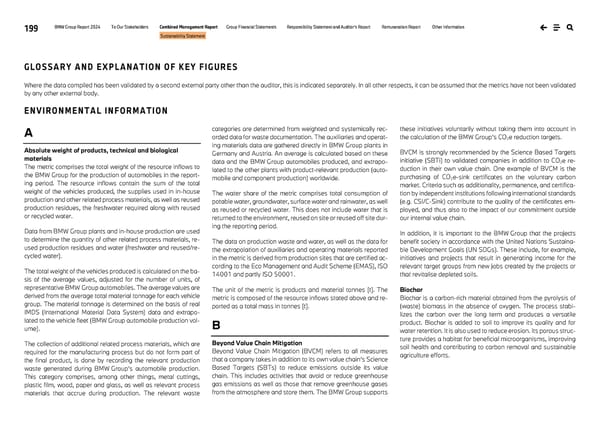199 BMW Group Report 2024 To Our Stakeholders Combined Management Report Group Financial Statements Responsibility Statement and Auditor’s Report Remuneration Report Other Information Sustainability Statement GLOSSARY AND EXPLANATION OF KEY FIGURES Where the data compiled has been validated by a second external party other than the auditor, this is indicated separately. In all other respects, it can be assumed that the metrics have not been validated by any other external body. ENVIRONMENTAL INFORMATION A Absolute weight of products, technical and biological materials The metric comprises the total weight of the resource inflows to the BMW Group for the production of automobiles in the report- ing period. The resource inflows contain the sum of the total weight of the vehicles produced, the supplies used in in-house production and other related process materials, as well as reused production residues, the freshwater required along with reused or recycled water. Data from BMW Group plants and in-house production are used to determine the quantity of other related process materials, re- used production residues and water (freshwater and reused/re- cycled water). The total weight of the vehicles produced is calculated on the ba- sis of the average values, adjusted for the number of units, of representative BMW Group automobiles. The average values are derived from the average total material tonnage for each vehicle group. The material tonnage is determined on the basis of real IMDS (International Material Data System) data and extrapo- lated to the vehicle fleet (BMW Group automobile production vol- ume). The collection of additional related process materials, which are required for the manufacturing process but do not form part of the final product, is done by recording the relevant production waste generated during BMW Group’s automobile production. This category comprises, among other things, metal cuttings, plastic film, wood, paper and glass, as well as relevant process materials that accrue during production. The relevant waste categories are determined from weighted and systemically rec- orded data for waste documentation. The auxiliaries and operat- ing materials data are gathered directly in BMW Group plants in Germany and Austria. An average is calculated based on these data and the BMW Group automobiles produced, and extrapo- lated to the other plants with product-relevant production (auto- mobile and component production) worldwide. The water share of the metric comprises total consumption of potable water, groundwater, surface water and rainwater, as well as reused or recycled water. This does not include water that is returned to the environment, reused on site or reused off site dur- ing the reporting period. The data on production waste and water, as well as the data for the extrapolation of auxiliaries and operating materials reported in the metric is derived from production sites that are certified ac- cording to the Eco Management and Audit Scheme (EMAS), ISO 14001 and partly ISO 50001. The unit of the metric is products and material tonnes [t]. The metric is composed of the resource inflows stated above and re- ported as a total mass in tonnes [t]. B Beyond Value Chain Mitigation Beyond Value Chain Mitigation (BVCM) refers to all measures that a company takes in addition to its own value chain’s Science Based Targets (SBTs) to reduce emissions outside its value chain. This includes activities that avoid or reduce greenhouse gas emissions as well as those that remove greenhouse gases from the atmosphere and store them. The BMW Group supports these initiatives voluntarily without taking them into account in the calculation of the BMW Group’s CO2e reduction targets. BVCM is strongly recommended by the Science Based Targets initiative (SBTi) to validated companies in addition to CO2e re- duction in their own value chain. One example of BVCM is the purchasing of CO2e-sink certificates on the voluntary carbon market. Criteria such as additionality, permanence, and certifica- tion by independent institutions following international standards (e.g. CSI/C-Sink) contribute to the quality of the certificates em- ployed, and thus also to the impact of our commitment outside our internal value chain. In addition, it is important to the BMW Group that the projects benefit society in accordance with the United Nations Sustaina- ble Development Goals (UN SDGs). These include, for example, initiatives and projects that result in generating income for the relevant target groups from new jobs created by the projects or that revitalise depleted soils. Biochar Biochar is a carbon-rich material obtained from the pyrolysis of (waste) biomass in the absence of oxygen. The process stabi- lizes the carbon over the long term and produces a versatile product. Biochar is added to soil to improve its quality and for water retention. It is also used to reduce erosion. Its porous struc- ture provides a habitat for beneficial microorganisms, improving soil health and contributing to carbon removal and sustainable agriculture efforts.
 BMW Group Report 2024 Page 198 Page 200
BMW Group Report 2024 Page 198 Page 200